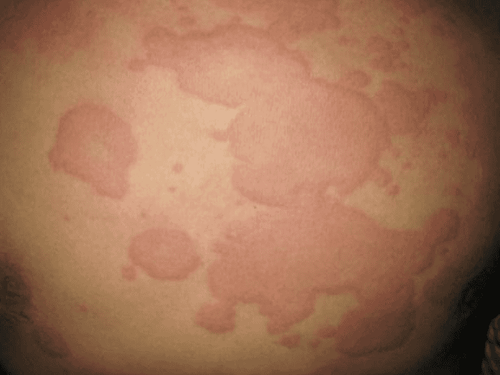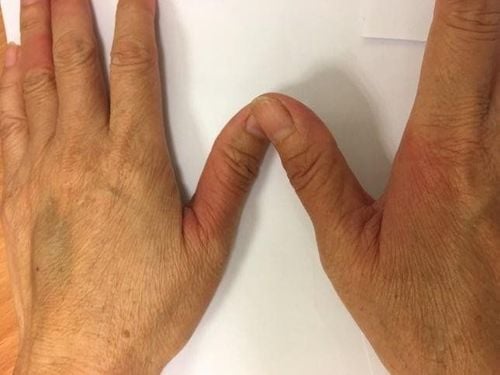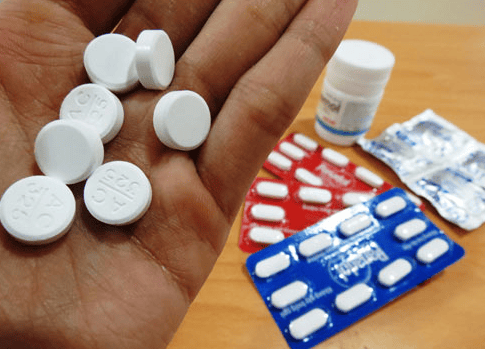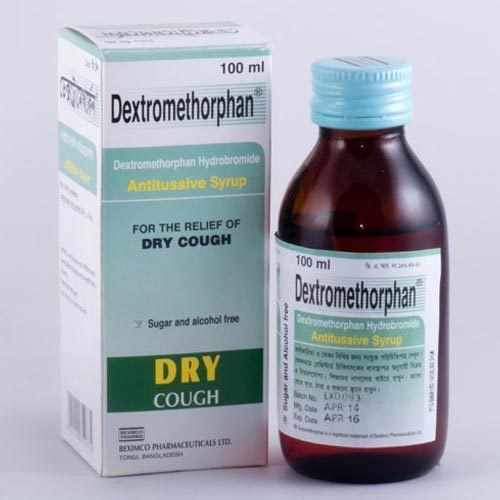This is an automatically translated article.
The article was written by Dr. BS Nguyen Van Dinh - Head of Allergy - Clinical Immunology Unit/ Medical Lecturer - Vinmec Times City Hospital/ Vinuni University.A drug allergy is an abnormal reaction caused by your immune system overreacting to a drug or its excipients. All drugs have the risk of causing an allergic reaction including western medicine, herbal medicine, traditional medicine and vaccines. However, there are a few drugs that are more likely to cause allergic reactions, including antibiotics, anti-inflammatory drugs, anti-inflammatory drugs, anesthetics, and contrast agents used in imaging studies. computed tomography, magnetic resonance imaging).
1. Common Manifestations of Drug Allergic Reactions
The most common manifestation of an allergic drug reaction is a skin rash or fever. However, there are cases of severe reactions that can be fatal or damage internal organs (kidneys, liver, respiratory tract, heart and brain) such as anaphylaxis or severe skin lesions.
Allergic drug reaction is an individual reaction. That is, it can happen to one person and not to another. It is therefore dangerous and unpredictable. It is different from the side effects of overdose, poisoning or other side effects that we know for sure will happen when we overdose. Drug allergies sometimes have no dose dependence, and even a small amount of a drug can cause severe allergic reactions and even death.


2. Who is at high risk of drug allergy?
Drug allergy is more common in people who are prone to allergic diseases (atopy):
Bronchial asthma, allergic rhinitis, urticaria or food-related allergic reactions Those who have had a history have had an allergic reaction to a previous medication. Increased risk of allergies associated with cross-allergies Family members with allergic disease Drug allergies are more common in women than in men, in the elderly compared with younger people because they may be related to comorbidities according to and number of drugs used In particular, some drugs have an increased risk of allergic reactions linked to genetics. For example, Vietnamese people are about 15-20 times more likely to be allergic to allopurinol for gout and carbamazepine for epilepsy than Caucasians because it is related to Vietnamese-specific genotypes.
3. What symptoms are suspected due to drug allergy?
Manifestations of drug allergy are quite diverse because they can involve many organs. It can range from mild as skin manifestations including erythema and pruritus to severe and fatal. Allergic reactions can occur immediately after taking the drug (from a few minutes to less than 1 hour) or occur slowly within hours, days or even months after taking the drug.
Manifestations of drug allergy include:
Erythema, itching, fever, runny nose, itchy eyes, watery eyes, swelling (lips, eyes, face, airways)

4. Severe manifestations of anaphylaxis
Anaphylaxis is a rare, life-threatening reaction. In anaphylaxis, there are many organ damage such as respiratory, digestive, circulatory and central nervous system. Signs and symptoms of anaphylaxis include:
Airway obstruction, feeling of throat or mouth blockage, tightness in the chest, difficulty breathing Feeling of nausea, vomiting, abdominal cramps due to intestinal spasms Vomiting and/ or defecation Dizziness, feeling of photophobia Fast, small, weak pulse Blood pressure drops Convulsions Loss of consciousness When one of the above symptoms is present after taking the drug, it must be detected and treated promptly. You need to call an ambulance to get to the hospital in time because the development of anaphylaxis happens very quickly and can be life-threatening.

5. Other manifestations of drug allergy
Less common allergic reactions that can occur after a few days to a few hours are called delayed reactions. Even when you stop taking the medicine, the symptoms continue. Manifestations include:
Serum sickness: drug-induced serum sickness usually occurs after about 1 week of taking the drug. Common manifestations are erythema on the skin, fever, swelling of the face and lips, nausea and joint pain. . Drug-induced anemia: a blood test that reduces the number of red blood cells. The patient feels fatigue, irregular heartbeat, shallow breathing and may be accompanied by other manifestations. Severe skin lesions: skin lesions may ulcerate partial or total skin erosion, may cause erythema. Organ damage including liver, kidney, drug-induced pneumonia, drug-induced meningitis. There may be manifestations of white blood cell disorders, painful swelling of the lymph nodes. The most common manifestation is fever, usually high fever > 38.5. Acute generalized pustular rash: Some patients have had a pinhead-like pustular rash on the skin that spreads over the body a few hours to a few days after taking the drug. There is fever, laboratory tests show neutrophilic leukocytosis. Drug-induced nephritis: after taking the drug, a few cases showed signs of fever accompanied by hematuria, swelling of the eyes, lips, and face.

6. Why do drugs cause allergies?
Drug allergy occurs when the body's immune system mistakenly considers a drug as a foreign element that can be harmful to the body like bacteria and viruses. When the drug is first introduced into the body, the immune system produces antibodies called IgE. These antibodies are produced abnormally and are the source of an allergic reaction later on.
When the body has this antibody, they are like an army waiting for the drug to "break through" into the body. When the drug is next introduced into the body, these pre-existing antibodies cause an "immune cascade". Chemical substances will be born like a bomb and harm the body. These chemicals dilate blood vessels -> produce erythema, papules on the skin, itching, severe can reduce blood pressure, cardiovascular collapse. Bronchospasm causes chest tightness, difficulty breathing...
Most of us do not know when the first time we are exposed to drugs that cause allergies. However, such drugs can be present in food, in nature (antibiotic-producing fungi) even in trace amounts (in very small amounts) and also cause the immune system to react. Therefore, when we are injected, taking the drug for the first time (actually the second time we are exposed) will encounter systemic reactions because the body already has antibodies waiting for it.
However, some drug allergies have other mechanisms because the nature of the drug and the way our immune system responds is very diverse. Therefore, the same drug can have many different types of reactions and manifestations, or conversely, many drugs can cause the same reactions, the mechanisms may be the same or different, possibly a true allergy. or pseudo-allergic reactions (aspirin, opiate analgesics and contrast agents).
Please dial HOTLINE for more information or register for an appointment HERE. Download MyVinmec app to make appointments faster and to manage your bookings easily.
Article referenced source: Mayoclinic.org













